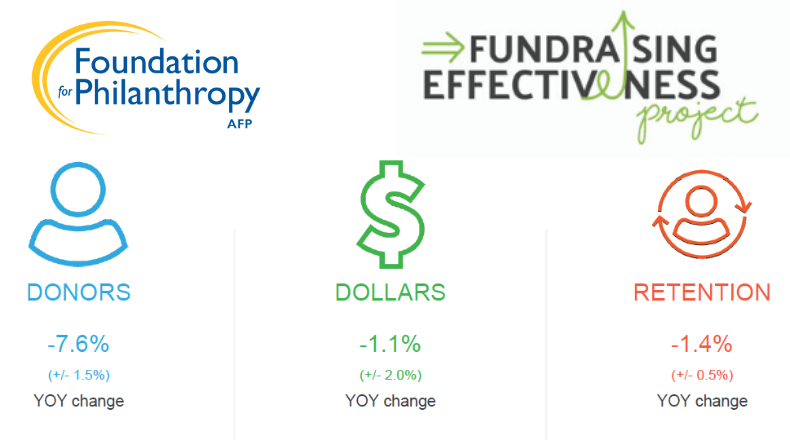Donor Retention and Acquisition Key Challenges for Social Sector in Q3 2023

Approaching year-end and a busy giving season, charitable giving trends demonstrated a persistent decline throughout 2023. According to FEP’s latest quarterly data, declining donors across all sizes and types presents a major hurdle for nonprofits. Through Q3 2023, donors decreased moderately and donor retention continued to slide, driving a slight decrease in fundraising dollars. While long-term repeat donors were the most stable group, a significant drop in new donor participation had a negative impact on overall trends.
The full Q3 2023 report is available here.
The Fundraising Effectiveness Project (FEP) is a collaboration among fundraising data providers, researchers, analysts, associations, and consultants to empower the sector to track and evaluate trends in giving. The project offers one of the only views of the current year’s fundraising data in aggregate to provide the most recent trends for guiding nonprofit fundraising and donor engagement. The FEP releases quarterly findings on those giving trends, released both via downloadable reports at https://afpglobal.org/fepreports and in a free online dashboard.
FEP Q3 2023 Report Key Takeaways
- Q3 data shows a continued steep decline in donor counts, with a Q3 YOY drop of 7.6% after late data adjustment. This continues a trend that began in 2021, after a large uptick in donations and donors in 2020. New Donors (down 16.9%) and newly retained donors (down 18.7%) were responsible for the majority of this decrease, whereas Repeat Retained donors, who represent 41.9% of all donors, dropped by 7.4%.
- Despite this overall decline in donors, dollars saw only a marginal year-over-year decrease of 1.1% in Q3. This decline was largely caused by a decline in Small and Micro donors (those who donated less than $500), substantial donor groups that accounted for 83.6% of all donors.
- There is still disparity in organizations performance based on their size. Smaller organizations seemed to perform relatively better this year compared to bigger ones.
While the busiest giving season is almost behind us, cooling US inflation provides the charitable sector with a major opportunity to finish the year strong. But as we look ahead to 2024, it’s clear that new strategies and approaches are needed to stabilize the sector and gather positive momentum.
“At the start of 2023, fundraisers predicted they would face challenges in new donor acquisition and continued support from large and major donors–and the data from FEP highlights the realization of those concerns,” said Ann Fellman, chief marketing officer for Bloomerang. “The current trends facing nonprofits underscore the need to refocus on engagement strategies that build relationships. Send simple surveys to learn donor interests and passions, strengthen your storytelling, personalize your outreach, and give out thank yous, which all go a long way. Human-to-human communications is what will help fundraisers create the emotional connection that serves as the foundation of a healthy donor relationship.”
“These results are a continuation of a troubling trend, but there are certainly opportunities here as well,” agreed Mike Geiger, the president and CEO of the Association of Fundraising Professionals and the AFP Foundation for Philanthropy. “The relatively strong performance of small organizations speaks to the value of grassroots engagement. As we finish up the year-end giving season and move into 2024, building relationships with new donors and creating accessible pathways for giving at all levels, but particularly for small and micro donors, will be more important than ever.”
Woodrow Rosenbaum, chief data officer of GivingTuesday, further amplified the message that grassroots engagement remains an urgent need for nonprofits, especially as pre-COVID declines in donors and dollars return to the social sector: “2023 has been a challenging year for many nonprofits, despite the incredible resilience of smaller organizations. Persistently declining donations across all donor types shows that the sector needs to focus on agility and adapting to the realities of donor behavior. Broad and regular engagement with grassroots givers can help create long-term, consistent donors during the end of year season and beyond into 2024.”
FEP reports continue to be made possible by the generous support of collaborating data providers, including Bloomerang, Classy, Community Brands, DonorPerfect, Keela, NeonOne and Qgiv. FEP’s partner network also includes data analysis and additional support from Bonterra. We welcome all giving platforms to join our efforts and increase our data coverage, enhancing the accuracy and accessibility of our efforts to provide measured analysis to the social sector.




